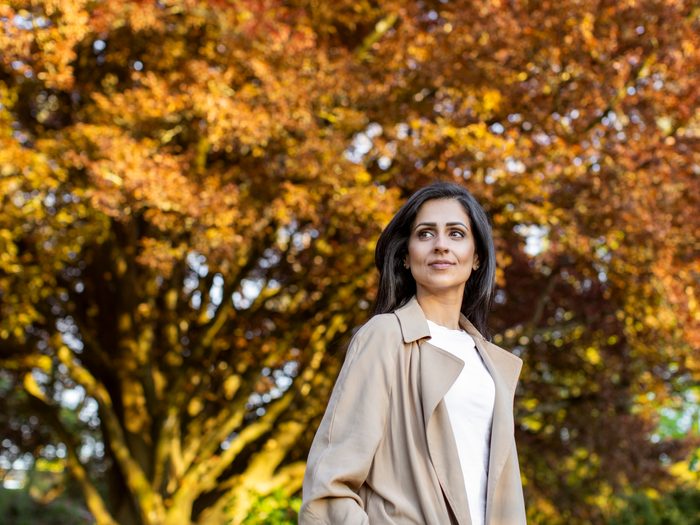“For All Those Years, No One Told Me Anything”

Roop Bassra, 38, shares her story of living with endometriosis — and how a lack of access to resources led to a delayed diagnosis and treatment.
I got my period when I was 11 years old. From the get-go, I got it every 14 days. My family doctor put me on birth control—he said my hormones were out of whack. I stayed on birth control until I was 23. I wanted to try life without it. About a year and a half later, I started getting a sharp, shooting pain in my abdomen, even when it wasn’t my period time. It scared me. My family doctor knew right away that it was endometriosis. I was really lucky in that sense. But the options were the pill or surgery. I didn’t want surgery, so I went back on the pill.
A couple of years later, I started nursing school, and my periods were getting worse. By the time I hit 30, I was missing days of my practicum because I couldn’t get out of bed. An ob-gyn sent me for surgery, which revealed I had endometriosis—they burned off quite a bit of it. By then, I was married and trying to get pregnant, so I stayed off the pill. My periods were still painful. The doctor said that would happen for a few months, but it just got worse. A year and a half after my first surgery, I went in for a second. The surgeon told me that all the endometriosis had already been removed, and I shouldn’t be having pain, but I was barely able to work. At some of the worst times, I’d look at the patients and think, I deserve to be lying down there.
But I just pushed through, and thought, ‘This is the way I have to live’. A friend sent me an article about a New York specialist. That’s where I learned about excision surgery. I had met a patient at work who had endometriosis, and she told me about the [specialized endometriosis clinic at] B.C. Women’s Hospital. I got a referral through my GP to the Centre for Pelvic Pain & Endometriosis, but there was a wait-list just to see someone and another wait-list for excision surgery. I couldn’t wait that long. I ended up flying to the United States for surgery.
I’d also developed adenomyosis, where the endometrium breaks through the muscle wall of the uterus. The surgeon told me to be monitored if I got pregnant naturally, because the pregnancy might not go as long as a normal pregnancy should. But I couldn’t get pregnant naturally. I started IVF but, again, my pain just got so severe when I was off birth control. Eventually, I stopped working.
I ended up having a hysterectomy at 36. I would say life is 50 percent better since the hysterectomy. Not having periods rule me has been life-changing, but I still suffer from endometriosis and have fatigue and nausea from that. I still need to see an excision specialist to remove the endometriosis. I’m still unable to work. I get sick very easily if I eat the wrong thing.
Not being able to get pregnant was one of the most painful journeys, physically and mentally. I battled a lot of depression and anxiety. It affects my husband’s life as well. I know you have to look at your life and think, What can I do moving forward to make myself happy again? Even if I don’t have kids, it’s still worth living.
I wonder why nobody looked at my 11-year-old self and thought, Why is she having periods every 11 to 14 days? For all those years, no one told me anything. I had endometriosis, most likely, and I never knew. An earlier diagnosis and access to specialists could have prevented it from getting this severe. Having more specialized centres would be beneficial, because there are so many of us who need help.
This essay is part of a larger package looking at women’s health gaps in Canada from our June/July 2021 print issue. Read more:
Women’s Health Collective Canada Is Addressing the Gap in Women’s Health
“The Uncertainty Was a Big Piece. And I Couldn’t Get Answers”
“One Ob-Gyn Diagnosed Me with PCOS. Another Ob-Gyn Said I Didn’t Have It”
Get more great stories delivered straight to your inbox by signing up for the Best Health Must-Reads newsletter. Subscribe here.




